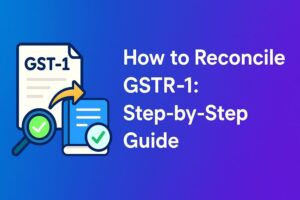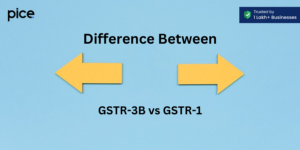Exploring the Impact of GST on Rental Properties: Insights into House and Commercial Rent Taxation
- 12 Aug 24
- 13 mins

Exploring the Impact of GST on Rental Properties: Insights into House and Commercial Rent Taxation
Key Takeaways
- Before GST, rental income from commercial properties was subject to Service Tax, while residential properties were exempt.
- GST introduced a unified approach, exempting residential rentals from tax but including commercial property rentals.
- Landlords renting to businesses must register for GST if turnover exceeds ₹20 lakhs (₹10 lakhs in special category states).
- The place of supply for rental properties determines whether CGST+SGST or IGST is applied, based on the property's location.
- GST allows businesses to claim Input Tax Credit on commercial property rentals, reducing the overall tax burden.
Rental Income Taxation Before GST

Before the introduction of the Goods and Services Tax (GST) in India, the taxation of rental income was primarily governed by the Service Tax regime for commercial properties, while residential properties were largely exempt. Commercial property owners were required to charge Service Tax if the total value of their taxable services exceeded a specified threshold.
This tax was applicable at a rate determined by the central government and was levied on the lease, rent, or license to use commercial properties. The Service Tax regime, however, did not extend to residential properties, which meant that individuals renting out residential spaces were not required to collect Service Tax from their tenants. This created a distinct separation in the tax treatment of residential versus commercial property rentals, with the former enjoying a tax-exempt status under the Service Tax laws.
Handle all your sales and purchase invoices in one place.
Pice’s all-in-one invoice management tool helps you track, send, and organize invoices from a single dashboard. Automatically share new invoices with customers, send timely payment reminders, and keep your collections under control—effortlessly.
Want early access? Fill out this form to get request a demo!
The Applicability of GST on Property Rentals
With the implementation of GST, a more unified approach was adopted towards the taxation of rental income from both residential and commercial properties. Under GST, the exemption threshold for taxation was revised, and a uniform tax regime was applied across various sectors, including real estate. The GST law specifically exempted the renting of residential dwellings for use as a residence from GST, thereby continuing the tradition of exempting residential rentals from the service tax.

However, commercial properties rented out for business purposes were brought under the ambit of GST, with a specified rate of tax applied to rental income.
This meant that landlords renting out commercial spaces are required to charge GST on the rent collected from their tenants if their total taxable turnover exceeds the GST registration threshold. This inclusion of commercial property rentals under GST aimed to streamline the tax process, eliminate the cascading effect of taxes, and bring more transparency and efficiency into the real estate sector's taxation. Landlords who rent out both commercial and residential properties need to understand the applicability and exemption criteria under GST to ensure compliance and optimal tax management.
💡If you want to pay your GST with Credit Card, then download Pice Business Payment App. Pice is the one stop app for all paying all your business expenses.
Registration Requirements for Property Rentals to Businesses
Under the Goods and Services Tax (GST) regime, individuals or entities renting out property to businesses must adhere to specific registration requirements. If the aggregate turnover from all taxable supplies, including rental income, exceeds the threshold limit established under GST—currently set at ₹20 lakhs for most states and ₹10 lakhs for special category states—registration is mandatory. This criterion applies irrespective of whether the property is commercial, indicating that landlords engaging in substantial rental activities are required to register under GST to comply with tax regulations.
The registration ensures that landlords can legally collect GST from their tenants, file returns, and claim Input Tax Credit (ITC) for taxes paid on inputs related to rental services. This move by the GST Council aimed to widen the tax base and bring more transparency into the real estate sector, making it imperative for property owners renting out to businesses to understand and fulfill their tax obligations.
Determining the Place of Supply for Rental Properties
The place of supply in the context of rental properties is a critical factor in determining the applicable GST charges—whether Central GST (CGST) plus State GST (SGST) or Integrated GST (IGST). According to GST law, for services related to immovable property, including renting, the place of supply is where the property is located. This means if both the property owner and the tenant are registered in the same state as the property, CGST and SGST are applicable.
Conversely, if the tenant is registered in a different state than where the property is situated, IGST is charged. This distinction is crucial for ensuring tax compliance and accurately filing GST returns. Landlords must understand these GST rules to correctly charge and avoid penalties for non-compliance. Identifying the correct place of supply helps in the proper allocation of tax revenue between states and ensures that the GST collected is credited to the state where the property is being utilized, adhering to the consumption-based tax model of GST.
GST Implications for Commercially Rented Properties

The Goods and Services Tax (GST) has significant implications for properties rented out for commercial purposes. Under the GST regime, commercial property rentals that are used for business or any commercial activity are subject to GST, provided the aggregate turnover of the landlord exceeds the threshold limit for registration. This inclusion of commercial rentals under GST means that businesses occupying rented premises are required to pay GST on the rent paid to the landlord.
The rate of tax on commercial property rentals is determined based on the current GST slabs and guidelines issued by the GST council. This move aims to bring uniformity in the taxation of services and goods across India, making the system more transparent and efficient. It's important for both landlords and tenants of commercial properties to be aware of these implications, as they affect leasing agreements, rental costs, and tax liabilities.
Calculating GST on Property Rentals
Calculating GST on property rentals involves applying the appropriate GST rate to the monthly or annual rental charges. The current standard rate for GST on commercial property rentals is set at 18%, but it's advisable to check for any updates or changes to this rate. To calculate the GST on rent, simply multiply the total rental amount by the GST rate applicable. For instance, if the monthly rent for a commercial property is ₹1,00,000, the GST at 18% would be ₹18,000, making the total payable amount ₹1,18,000.
It's crucial for landlords to issue GST-compliant invoices to their tenants, detailing the rental amount and the GST charged. These invoices are necessary for tenants to claim Input Tax Credit (ITC) if they are eligible. The calculation process must be accurately carried out to ensure compliance with GST laws and to avoid any discrepancies that could lead to penalties or legal issues. Both landlords and tenants should also stay informed about any changes in GST rates or rules that may affect the calculation of GST on property rentals.
Input Tax Credit (ITC) Eligibility for Properties on Rent
The Goods and Services Tax (GST) framework allows for the claim of Input Tax Credit (ITC) on properties rented out for commercial purposes, presenting a significant advantage for businesses. ITC enables businesses to deduct the GST paid on their rental expenses from the GST they owe on their sales, effectively reducing their overall tax burden. However, to be eligible for ITC, the rented property must be used for business or commercial activities.
This provision aligns with the GST’s aim to eliminate the cascading effect of taxes, ensuring that tax is only paid on the value addition at each stage of the supply chain. It's important for businesses to maintain accurate records and invoices to support their ITC claims, as these documents are crucial during audits or assessments by tax authorities.
Input Tax Credit for Repairs and Renovations on Rented Properties
GST also extends the benefit of Input Tax Credit to repairs and renovations undertaken on rented commercial properties. This means that businesses can claim ITC on the GST paid for services and goods used in the repair or renovation of such properties, provided these expenses are directly related to the business activities conducted on the premises.
This can include a wide range of services from minor repairs to major renovation projects that enhance the value or utility of the property for commercial use. Like all ITC claims, it is essential for businesses to ensure that the repairs and renovations are necessary for, and directly linked to, their commercial activities to qualify for the credit. Accurate and comprehensive documentation of all expenses and GST invoices is key to substantiating these claims and securing the associated tax benefits.
Income Tax Deduction Provisions for Properties under Rent
In addition to the Goods and Services Tax (GST) implications, property owners who rent out their properties can also avail themselves of certain income tax deduction provisions. These deductions are designed to reduce the taxable income generated from property rent, thereby lowering the overall income tax liability of the property owner.
One of the primary deductions available is for municipal taxes paid during the year on the rented property. Property owners can deduct the amount paid for these taxes from the rental income, provided the payment is made within the relevant financial year. Another significant deduction comes in the form of the standard deduction, which is a fixed 30% deduction on the net annual rental income. This deduction accounts for expenses related to repairs, maintenance, and upkeep of the property, irrespective of the actual expenditure incurred.
Additionally, property owners can claim deductions for interest on loans taken for the purchase, construction, or renovation of rented properties. This deduction is particularly beneficial for those who have invested in property through financing and are paying interest on loans.
It's important for property owners to maintain proper documentation and records of all expenses and payments to avail of these deductions accurately. These income tax deductions, when combined with the correct application of GST provisions, can significantly optimize the financial returns from rental properties.
E-way bill on renting properties
An e-way bill, or electronic way bill, is a document required by the Indian tax authorities for the movement of goods exceeding a certain value threshold. It's part of the Goods and Services Tax (GST) regime and is primarily used to track the movement of goods from one place to another, ensuring compliance with GST regulations. The e-way bill system aims to prevent tax evasion and ensure goods are transported with all necessary tax payments.
When it comes to the concept of renting, the e-way bill typically applies to the physical movement of goods. Therefore, in the context of property rentals (such as renting office space, warehouses, or residential properties), the generation of an e-way bill does not directly apply because these transactions involve the leasing or renting of immovable property rather than the movement of goods.
However, if the rental agreement includes or involves the transfer of goods from the landlord to the tenant (for instance, furniture, office equipment, or any other tangible goods as part of the lease), then the movement of these goods might require the generation of an e-way bill, provided the value of the goods being transported meets the threshold limit set by the GST authorities. It's crucial for businesses to assess the nature of their rental transactions and determine if any aspect involves the transfer of goods that could necessitate the generation of an e-way bill.
In summary, while the renting of immovable property itself does not trigger the requirement for an e-way bill, any associated movement of goods as part of a rental agreement may do so, depending on the value of the goods and the specific regulations in force at the time of the transaction. Landlords and tenants should stay informed about the latest GST guidelines to ensure compliance in all aspects of their rental arrangements.
FAQs
Do residential properties used for residential purposes attract GST when rented out?
What are the GST registration requirements for a taxable person renting out property to businesses?
Can a registered taxpayer under the GST composition scheme charge GST on rented properties?
How is Input Tax Credit (ITC) handled for properties rented out for commercial purposes?
Is ITC available for repairs and renovations on a rented property given on rent by a composition dealer?
Can a composition dealer receive rent?
Which services are eligible for composition scheme under GST?
This threshold is subject to periodic revisions and may vary, so it's crucial to stay updated with the latest GST notifications. The scheme is designed to simplify GST compliance and reduce the tax burden for small businesses by allowing them to pay GST at a fixed rate on their turnover without claiming input tax credits.
 By
By 
















